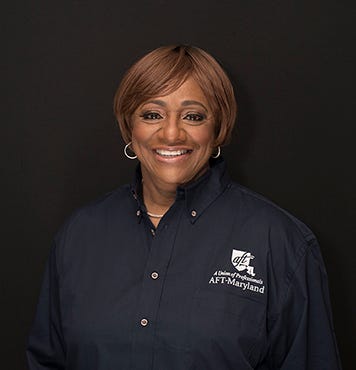If you care about black people, you should care about Janus
by Marietta English
Unions are all abuzz with talk about the Supreme Court case Janus v. AFSCME. I know it all sounds so dry and bureaucratic. But take a closer look and you will see that Janus, which pits a single state employee — backed by anti-union groups — against a public workers union, threatens countless Americans.
The case argues whether unions can collect dues from all the workers who enjoy union benefits like fair salaries and safe working conditions — or whether some workers can get a free ride. Without dues, unions would be less able to protect workers — including teachers, police officers, firefighters, custodians, bus drivers, cafeteria workers, college professors and city clerks, all of whom serve the public. So it’s about more than dues. It’s about people. People in public sector jobs.
Many of those people are black. In fact, about 20 percent of black people work in the public sector.
Ifyou care about black people, you should care about Janus. If you care about salaries and wages in a public school district, you should care about Janus. And if you care about quality education, you should care about Janus.
This case is about stripping public sector workers of their voice. It’s also about stripping them of their wages and opportunity to achieve the American dream.
If the Supreme Court rules against AFSCME (the American Federation of State, County and Municipal Employees), those likely to take the brunt of the blow will be black people. Black civil servants.
If the Supreme Court rules against AFSCME, those likely to take the brunt of the blow will be black people.
For so many people of color, the public sector has been the safest workplace from discrimination. And for many of us, and our parents and family members, public sector work has also been a vehicle of social mobility. It has given us the opportunity to have quality healthcare, a pension and some money on the side to enroll our children in the activities that make them more whole and well-rounded. A loss in this case would rob us and our families and friends of our vehicle for social mobility.
In addition to that, when wages are up for government employees, wages are up for all black people. We are years past the so-called end of the recession, but black wealth has not returned, and it is not growing the way it has in other communities. A big reason for this is the assault on public workers. Our friends in right-to-work states know this all too well.
You may have heard the phrase “a rising tide lifts all boats.” Well, a union wage lifts all wages.
You may have heard the phrase “a rising tide lifts all boats.” Well, a union wage lifts all wages. So even nonunion members should care about Janus.
I also worry about how a loss in this case would harm public education. Teachers unions work to ensure that those who educate our children have the proper and necessary training, because when the requirements to be a teacher are too lax, we see ill-prepared teachers in the classroom. Fairly negotiated contracts with unions and school boards aren’t just for the teachers’ protection. They’re also for the students.
We can’t claim that education is the pathway out of poverty and then put teachers in front of our students unequipped to do the job. A Janus loss would ultimately rob teachers of their strength in collective bargaining and allow under-qualified, lower-wage teachers to stand before our students. We’ve seen that movie before, and it doesn’t end well for us or for our children.
A Janus loss would ultimately rob teachers of their strength in collective bargaining and allow under-qualified, lower-wage teachers to stand before our students.
The American Federation of Teachers represents not only teachers but also paraprofessionals, bus drivers, cafeteria workers and custodians. We represent public college professors and staff, state and municipal workers, and public healthcare workers like nurses, lab technicians, addiction counselors and social workers. The AFT supports all these workers and, by extension, supports and celebrates countless people of color in the workplace.
For all those people, the union must remain strong, especially in the face of Janus. Whatever happens, our collective voice must continue to ring out.

Marietta English is the president of the Baltimore Teachers Union and AFT-Maryland, and is an AFT vice president.